2020 Vision: If a single speech can shake up the Democratic race, it might happen in Iowa
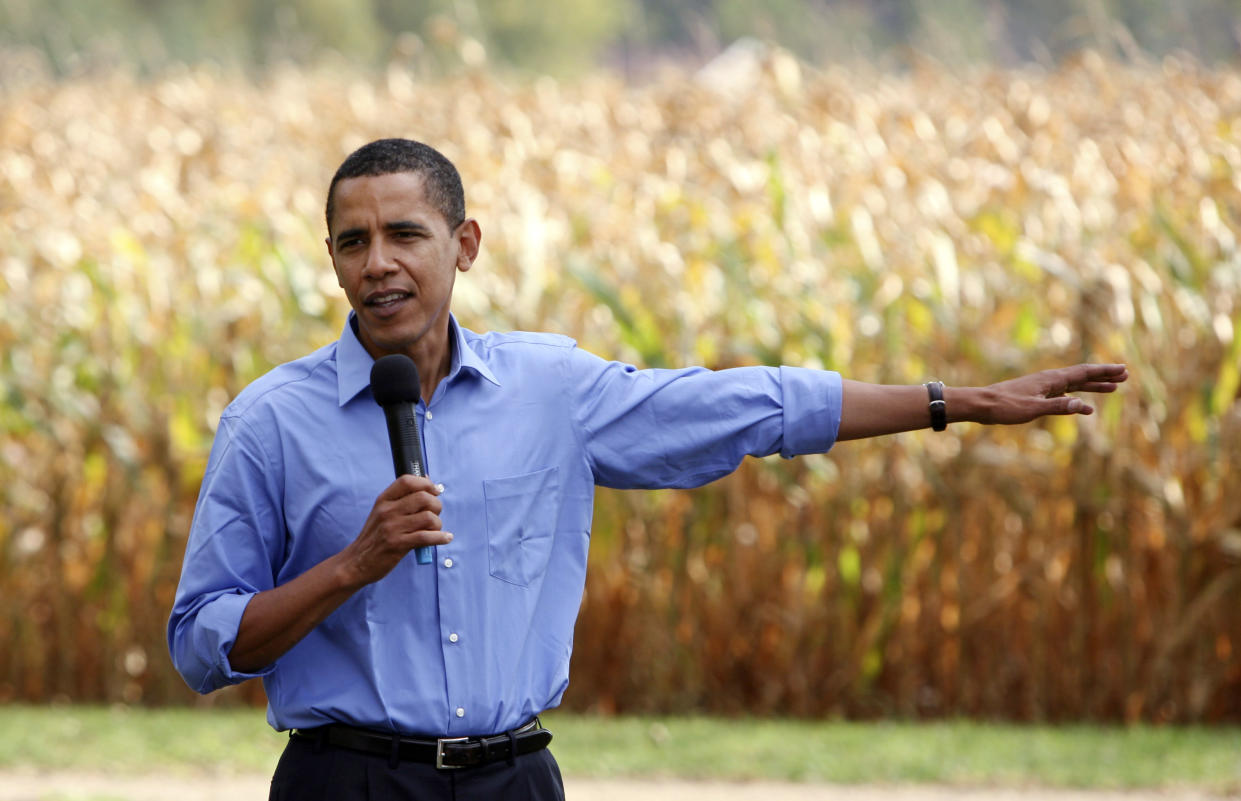
Welcome to 2020 Vision, the Yahoo News column covering the presidential race. Reminder: There are 94 days until the Iowa caucuses and 368 days until the 2020 presidential election.
BREAKING: Beto O’Rourke announced on Friday that he is dropping his presidential bid >>>
With fewer than 100 days to go until Iowans cast the first votes of the 2020 Democratic primary contest, the time has come for the field to descend on Des Moines for the caucuses’ last — and largest — organizing event: the legendary Jefferson-Jackson Dinner.
Or rather, as it is now called, the “Liberty and Justice Celebration.”
Friday’s gathering is the first since progressive activists led a successful campaign to remove the third and seventh presidents’ names from these local Democratic galas, a belated response to Jefferson’s slave ownership and Jackson’s ethnic cleansing of Native Americans.
But while the event’s name might have changed, it is still the place to be seen for aspiring presidential candidates. On Nov. 10, 2007, Barack Obama strode onstage and delivered a retooled stump speech that attacked his main rival, Hillary Clinton, as a “poll-tested” politician running “the same old Washington textbook campaign.” In the hall, his hyper-organized army of supporters marched, shouted and waved light sticks in a show of grassroots strength and campaign discipline that Iowa pols still cite as the gold standard.
Before that year’s “JJ,” Obama was trailing Clinton by more than 6 percentage points in the Iowa polls. By the end of the month, he’d blown past her and was well on his way to winning the caucuses.
Can any of this year’s candidates pull an Obama at the “LJ”?
It’s certainly possible. The 2007 JJ took place just 54 days before the caucuses, so momentum was easier to sustain; this year there will be 94 days between the dinner and caucus night.
But a big speech and a big spectacle could still shake things up.
As in 2007, multiple candidates are bunched near the top of the Iowa polls. Back then, it was Clinton at 30 percent, Obama at 23.6 percent and former North Carolina Sen. John Edwards at 19.6 percent. This year, it’s Elizabeth Warren at 22.3 percent, Pete Buttigieg at 17 percent, Joe Biden at 15.7 percent and Bernie Sanders at 15.3 percent.
[Who’s running for president? Click here for Yahoo News’ 2020 tracker]
Ten other candidates are set to speak Friday, but all 12,000 pairs of eyes in the Wells Fargo Center will be on the top four. Of them, Sanders and Biden seem least likely to spark a shift in public opinion. Both are familiar to voters. Biden has been falling in the Iowa polls (from a high of 28.5 percent in September). And Sanders will be holding an additional separate event for current supporters, having decided not to organize for the chanting-and-sign-waving competition.
Warren and Buttigieg — by far the state’s two most organized candidates — could be a different story. Locally, Buttigieg has been on fire in recent weeks, rising nearly 10 percentage points in the Iowa polls since mid-September on the strength of a reworked message that seeks to position him as a kind of Goldilocks candidate for wavering Dems: less status quo than Biden but more pragmatic than Warren.
Meanwhile, Warren has earned rapturous responses at previous “cattle call” events with a message that might sound familiar to Iowans searching for another savior.
“There is a lot at stake, and people are scared, but we can’t choose a candidate we don’t believe in because we’re scared,” Warren said at the New Hampshire Democratic Convention in September. “I am not afraid, and for Democrats to win, you can't be afraid either.”
Or as Barack Obama put it a dozen years ago: “If we are really serious about winning this election, Democrats, we can’t live in fear of losing it.”

‘Mathematical gymnastics’
Early Friday, Warren finally announced how she plans to finance Medicare for All, a topic she has previously avoided discussing. She pledged that her plan won't raise taxes on middle-class families, and said that it will result in the elimination of $11 trillion in premiums and other out-of-pocket costs.
“My plan won't raise taxes one penny on middle-class families,” Warren tweeted. “In fact, we’ll return about $11 TRILLION to the American people. That’s bigger than the biggest tax cut in our history.”
Some of Warren’s rivals, including Biden, quickly pounced.
“The mathematical gymnastics in this plan are all geared towards hiding a simple truth from voters,” the Biden campaign said in a statement. “It’s impossible to pay for Medicare for All without middle-class tax increases.”
Warren responded by saying that former Obama administration officials back her cost estimates.
“If Joe Biden doesn’t like that,” she told reporters, “I’m just not sure where he’s going.”

A Bernie bump?
The Bernie Sanders campaign appeared to be in rough shape at the beginning of October as the candidate seemed stalled in the polls and took a break from the road after a mild heart attack. But since his return to the trail, it’s been mostly good news for the 2016 primary runner-up. His debate appearance received strong reviews and a few days later he had the largest rally of any Democrat this year, as he earned the endorsement of freshman Rep. Alexandria Ocasio-Cortez. Politico reported this week about Sanders’s increasing traction with Hispanic voters, buoyed by the support of Ocasio-Cortez, San Juan Mayor Carmen Yulin Cruz and rapper Cardi B.
This week also saw some good news for Sanders in the first two states to vote. First, a CNN survey of New Hampshire found him with a narrow 21-to-18 lead over Warren, with Biden down to 15. The poll also found Sanders as most likable and the candidate people thought would handle health care and climate change best. The poll also had some positive signs for Warren, who topped the list of respondents’ second choices and saw an increase in those who thought she had the best chance of winning the general election.
That was followed by a New York Times/Siena poll showing a four-way race in Iowa, with Warren at 22, Sanders at 19, Buttigieg at 18 and Biden in fourth at 17. Among respondents, 55 percent of Sanders supporters said they had made up their mind, the most of any candidate by far.
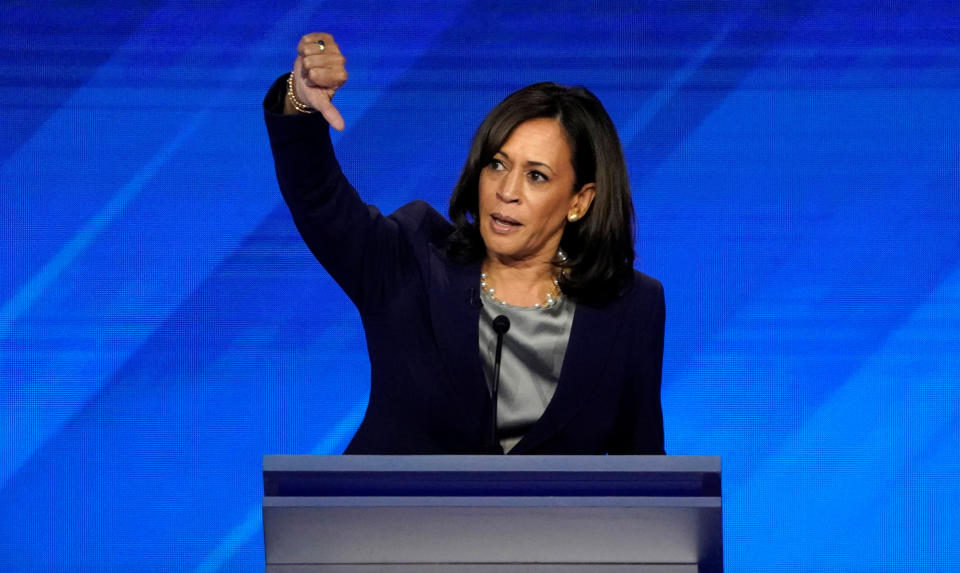
Harris campaign cuts budget and lays off staff
In the aftermath of the first set of Democratic debates in June, Sen. Kamala Harris’s campaign was flourishing. After confronting former Vice President Joe Biden on his civil rights record, she saw a bump in fundraising and polling, reviving a campaign that had been flagging after a launch in her hometown of Oakland, Calif., that drew a crowd of over 20,000.
It’s been downhill since then, as Harris has drifted into the low single digits in most polls — her polling average is down to just under 5 percent, a 10-point drop from the July peak — and lagged in third-quarter fundraising. In September, her campaign put a renewed focus on Iowa and she bluntly told a colleague, “I’m f***ing moving to Iowa.” So far it hasn’t moved the needle, as she’s failed to crack 5 percent in any October polls of the Hawkeye State.
With voting now just over three months away, the Harris campaign announced this week it’s laying off some staff while shifting others to Iowa. According to a memo from campaign manager Juan Rodriguez to supporters and staff, Harris will make cuts at the Baltimore headquarters while reallocating staff from early primary states (like New Hampshire, Nevada and her home state of California) to Iowa. Rodriguez also said that both he and consultants would be taking a pay cut. The memo points out that John Kerry in 2004 and John McCain in 2008 went through similar cutbacks but went on to win their party’s nomination.
“Campaigns are about tough choices and this one is no different,” said Lily Adams, Harris’s communications director, on Twitter. “Kamala & this team launched with 1 goal in mind: win the nomination & take on Trump. It wasn’t to just participate. We’re going to make the hard choices necessary to put us in a place to achieve that goal.”
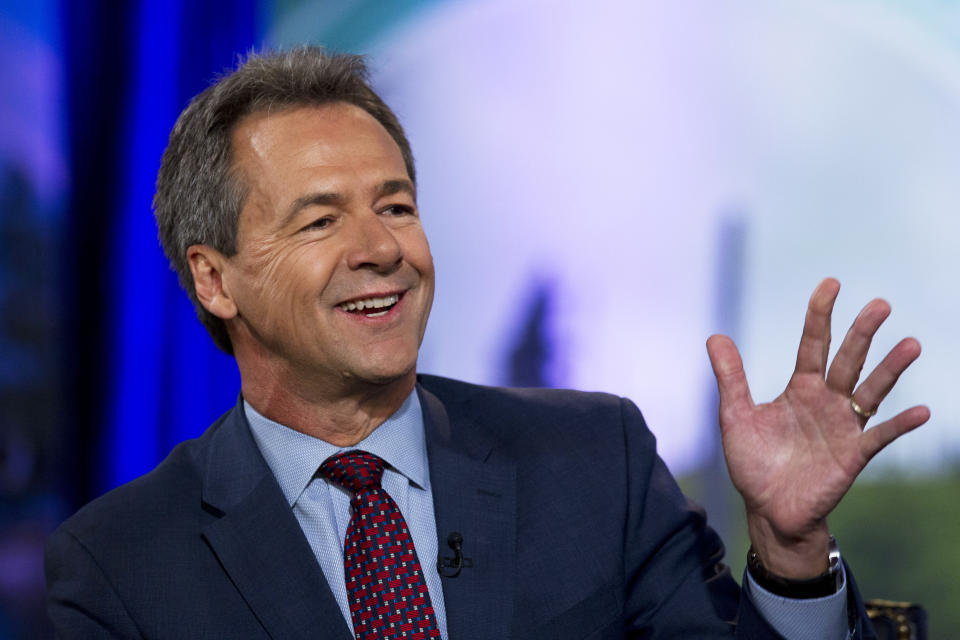
Bullock pays for an unlikely endorsement
Struggling to break through into the Democratic primary conversation, Montana Gov. Steve Bullock turned to an unlikely source of support: Anthony Scaramucci, a Trump supporter turned critic who served for 11 days as White House communications director before losing his job over a profanity-laced rant to a reporter. Bullock paid $100 on Cameo, a service that allows users to pay “celebrities” of varying fame to record personalized video messages, for an endorsement from Scaramucci of “Steve B.”
“We support you, Steve B,” said Scaramucci, recording in a moving vehicle. “I know you got a tough race ahead of you. But you’ve done this before. You know how to win. Just keep putting one boot in front of the other and march ahead. I’m behind you 100 percent. See you at the finish line.”
You know what's really spooky this Halloween?
The fact that a former Trump White House Communications Director will say anything you ask him to for $100. pic.twitter.com/QDCWUyS8gw— Steve Bullock (@GovernorBullock) October 31, 2019
The influence of dark money in politics has been a particularly important issue in Montana, a point Bullock used his Cameo purchase to illustrate.
“You know what's really spooky this Halloween?” asked Bullock on Twitter. “The fact that a former Trump White House Communications Director will say anything you ask him to for $100. Mr. Scaramucci didn’t know the source of the $100, but he allowed it to enter his wallet despite the potential consequences — just like how our broken campaign finance system allows Dark Money to enter our elections & influence our politics. A frightening tale indeed!”
Scaramucci replied with a tweet mocking Bullock’s fundraising. He said the money he was paid would go to charity.

Get ready for more Nikki Haley VP rumors
Earlier this year, there had been some speculation that former U.S. Ambassador to the United Nations Nikki Haley might replace Vice President Mike Pence on President Trump’s 2020 ticket.
Haley, at least publicly, tried to tamp down the VP talk in a tweet: “Enough of the false rumors. Vice President Pence has been a dear friend of mine for years. He has been a loyal and trustworthy VP to the President. He has my complete support.”
But a few recent developments, and an upcoming book tour, could reignite Trump-Haley 2020 rumors.
Earlier this week, Haley delivered a long speech at the American Enterprise Institute's annual dinner in Washington, where she defended Trump as a duly-elected “disruptor” — and criticized those inside the administration for working against him.
“When I was in the administration, I served alongside colleagues who believed that the best thing to do for America was to undermine and obstruct the president,” Haley said. “Some wrote about it anonymously in the New York Times. Others just did it.
“They sincerely believed they were doing the right thing,” she continued. “I sincerely believed they weren't. The president was the choice of the people, in accordance with our founding charter. No policy disagreement with him, no matter how heartfelt, justifies undermining the lawful authority that is vested in his office by the Constitution.
“For those who don’t like the president, they are free to protest him, and many do,” Haley added. “But if you serve in the administration, you are not free to push your personal agenda.”
And Haley’s new book, “With All Due Respect: Defending America With Grit and Grace,” will be released on Nov. 12.

The title refers to her memorable response when White House economic adviser Larry Kudlow said she suffered “some momentary confusion” after suggesting Russian sanctions were coming in April 2018.
“With all due respect, I don’t get confused,” Haley said.
Last year, Haley reportedly sold her home in South Carolina and became a resident of New York. Coincidentally (unless you’re a conspiracy theorist), it was reported this week that Trump was moving out of New York and would make Florida his legal residence. A source said the move was for tax reasons, but it also means he could choose a New York state resident as his running mate in 2020 without facing the obstacle posed by the 12th Amendment to the Constitution.
Contrary to popular belief, the amendment does not say that the president and vice president must come from different states, but that electors from a given state cannot vote for a resident of that same state for both offices. Since New York is unlikely to go Republican in 2020, it’s probably not a serious concern.
Of course, you never know.
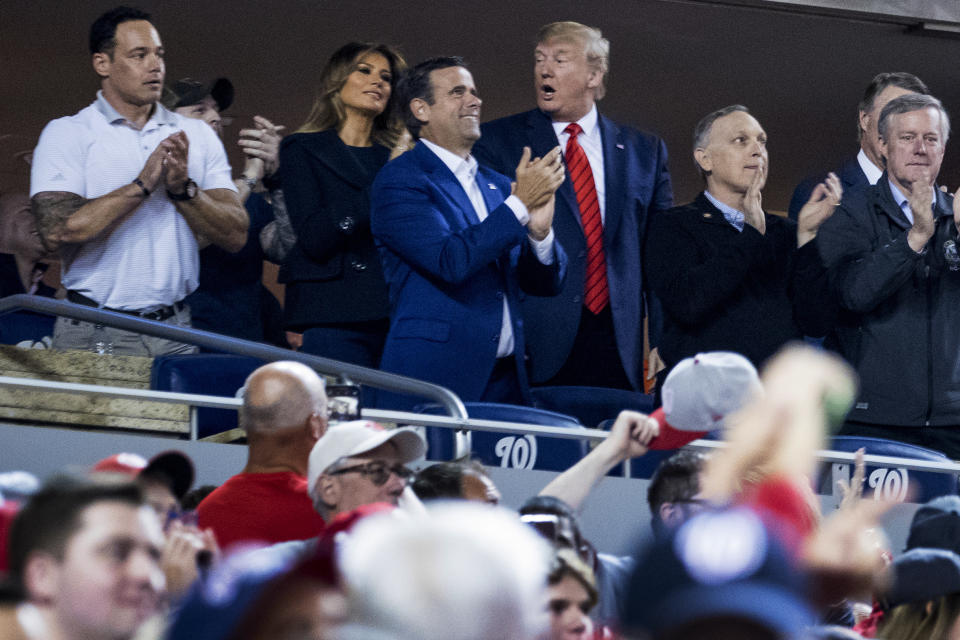
Calendar
Friday, Nov. 1: President Trump is holding a “Keep America Great Again” rally in Tupelo, Miss., at 8 p.m. ET. (In a Friday morning tweet Trump mistakenly wrote, “Louisiana, I'll see you tonight.”) Meanwhile, leading Democratic candidates will gather at the aforementioned Liberty and Justice Celebration (formerly the Jefferson-Jackson Dinner) in Des Moines, Iowa.
Monday, Nov. 4: President Trump is welcoming the 2019 World Series champions Washington Nationals to the White House at 1:15 p.m. ET. He also has a campaign rally in Lexington, Ky., at 7 p.m. ET.
Wednesday, Nov. 6: The president will appear at a rally in Monroe, La., at 8 p.m. ET.
Sunday, Nov. 17: Sen. Bernie Sanders will return to Las Vegas for the first time since his heart attack to participate in the Nevada State Democratic Party’s “First in the West” dinner.
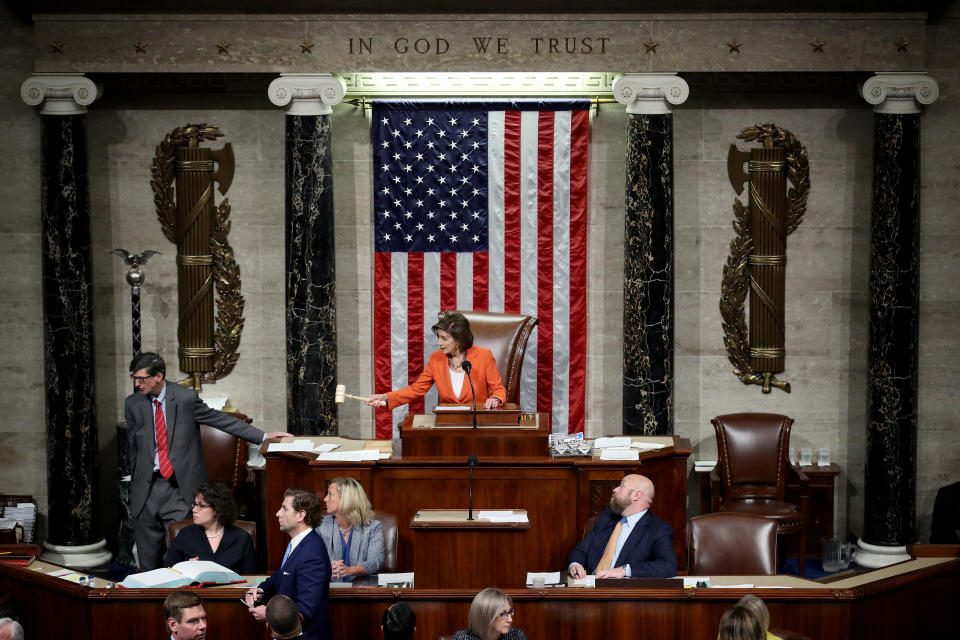
Verbatim
“This is a sad day. It’s a sad day because nobody comes to Congress to impeach a president of the United States. No one.”
— House Speaker Nancy Pelosi before Thursday’s vote to proceed with the impeachment inquiry into President Trump
“The Greatest Witch Hunt In American History!”
— President Trump, on Twitter, after the House passed the historic impeachment resolution
“For two weeks now that Congress has been in session, the Dems have been stomping their feet and plugging their ears and crying and screaming the word ‘impeachment’ like children.”
— White House press secretary Stephanie Grisham, on Fox News Thursday
“Surrounded by enemies and spies catching and perverting every word that falls from my lips or flows from my pen, and inventing where facts fail them.”
— Thomas Jefferson, in a letter to his daughter Martha, as quoted by Ivanka Trump in a tweet defending her father, President Trump, after the House vote
“There would be a lot of benefit to Trump and Trumpism getting a resounding, thumping defeat at the ballot box because that is what will be required.”
— South Bend, Ind., Mayor Pete Buttigieg, in an interview with the Boston Globe, raising questions about the strategy of attempting to remove Trump by impeachment
“I don’t see what I could tell him that he hasn’t already heard. I think it would be a waste of time, really.”
— Greta Thunberg, Swedish teenage climate activist, to Ellen DeGeneres on whether she would meet with President Trump
“I’m going to make sure that we rejoin the Paris Peace Accord on day one.”
— Former Vice President Joe Biden, in a gaffe shared on Twitter by the Trump campaign this week, mistakenly referring to the 2015 Paris Agreement on climate change as the Paris Peace Accords — signed in 1973 to end the Vietnam War
“Louisiana, I’ll see you tonight.”
— President Trump, on Twitter, hours before he was due to depart the White House for a rally in Mississippi
Elizabeth Warren and her dog, Bailey pic.twitter.com/3GDBkvlb22
— Tyler Pager (@tylerpager) November 1, 2019
Read more 2020 coverage from Yahoo News:
House Dems face question: Impeach Pence, or make him president?
Ivanka Trump quotes Thomas Jefferson in defense of her father
Rep. Katie Hill, targeted by revenge porn, resigns with a blast at Trump
GOP wipeout feared as impeachment spills over into House and Senate races
In Trump pitch at black college, its students were largely absent
Tulsi Gabbard is having a moment, and the party is getting nervous




